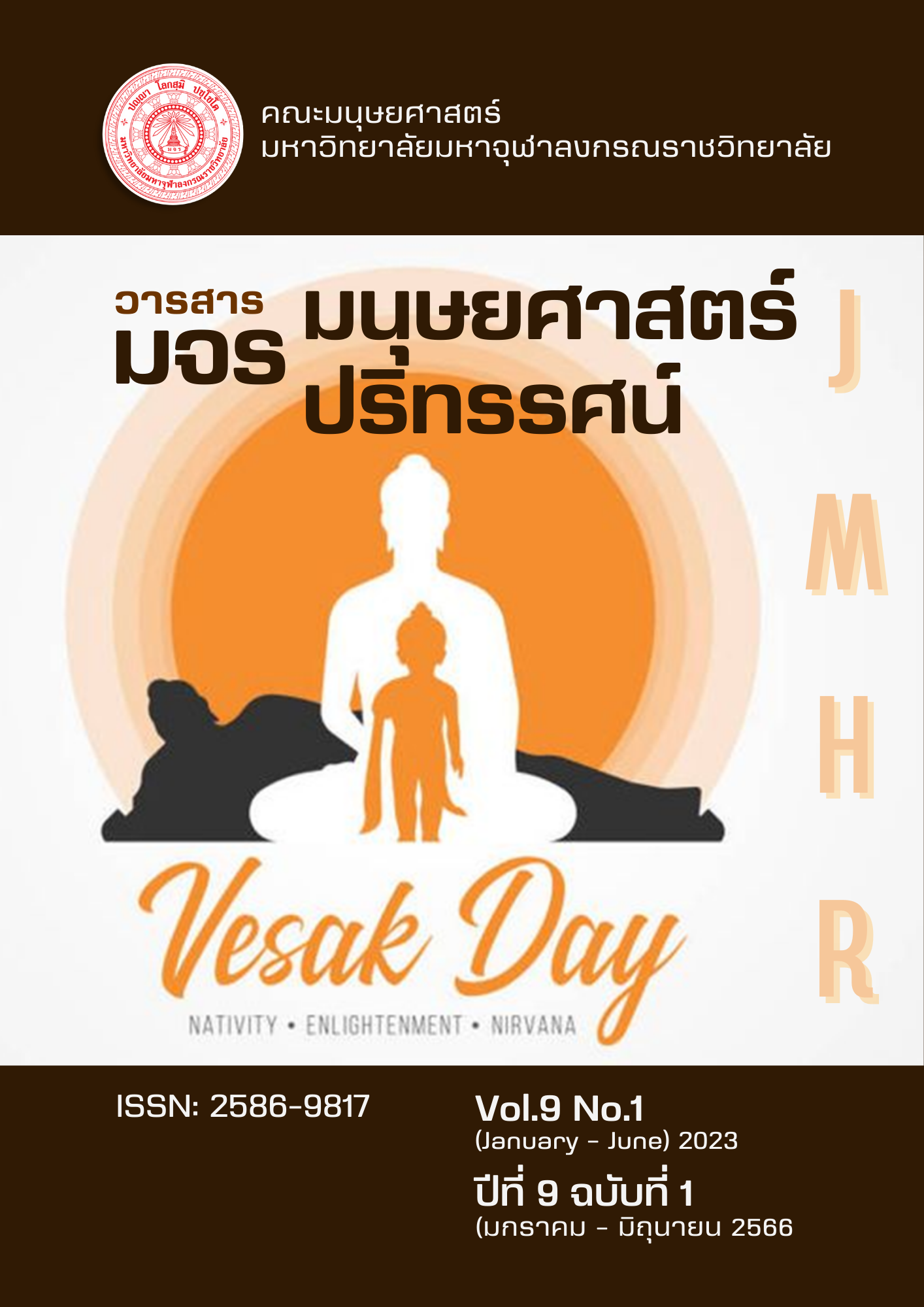การเสริมสร้างสภาพพฤฒพลังด้วยหลักพุทธธรรมของผู้สูงอายุในเขตพื้นที่บ้านแวงน้อย ตำบลแวงน้อย อำเภอแวงน้อย จังหวัดขอนแก่น
คำสำคัญ:
การประยุกต์, พุทธธรรม, ภาวะพฤฒพลัง, ผู้สูงอายุบทคัดย่อ
การวิจัยนี้มีวัตถุประสงค์ เพื่อศึกษาสภาพพฤฒพลังของผู้สูงอายุและเพื่อนำเสนอผลการเสริมสร้างสภาพพฤฒพลังด้วยหลักพุทธธรรมของผู้สูงอายุในเขตพื้นที่บ้านแวงน้อย ตำบลแวงน้อย อำเภอแวงน้อย จังหวัดขอนแก่น เป็นวิธีวิจัยเชิงคุณภาพ ใช้แบบสัมภาษณ์เชิงลึกแบบมีโครงสร้างเก็บรวบรวมข้อมูลจากผู้ให้ข้อมูลสำคัญ ซึ่งเป็นผู้สูงอายุในเขตพื้นที่บ้านแวงน้อย ตำบลแวงน้อย อำเภอแวงน้อย จังหวัดขอนแก่น จำนวน 10 คน โดยวิธีการเลือกแบบเจาะจง การวิเคราะห์ข้อมูลใช้วิธีการวิเคราะห์ข้อมูลเชิงเนื้อหา
ผลการวิจัยพบว่า 1) สภาพพฤฒพลังของผู้สูงอายุในด้านสุขภาพภาพกายแข็งแรง เพราะมีอาชีพเกษตรกรรมทำให้ได้ออกกำลังกาย และมีสุขภาพจิตสดใสเพราะใกล้ชิดธรรมชาติ ในด้านสังคม ทำให้ตัวเองมีคุณค่าโดยสร้างความผูกพันกับสมาชิกในครอบครัว สร้างความสัมพันธ์อันดีกับเพื่อนบ้าน และมีส่วนร่วมในกิจกรรมของชุมชนสม่ำเสมอ ในด้านความมั่นคงทางเศรษฐกิจ มีการวางแผนการใช้จ่ายเงินร่วมกับสมาชิกในครอบครัวและพยายามพึ่งพาตนเองด้วยอาชีพที่ทำ และในด้านที่อยู่อาศัยที่มั่นคง มีการปลูกสร้างที่อยู่อาศัยในที่ดินตนเองด้วยรายได้ตนเองและจากลูกหลาน และ 2) ผู้สูงอายุเสริมสร้างสภาพพฤตพลังด้วยการใช้หลักพรหมวิหารธรรมเป็นหลักสำคัญในการวางตน เป็นผู้สูงอายุที่เป็นร่มโพธิ์ร่มไทรให้กับคนในครอบครัวและชุมชน ใช้สังคหวัตถุธรรมเป็นหลักในรูปของการแบ่งปัน ใช้คำพูดที่เหมาะสม ช่วยเหลือด้วยแรงกายตามโอกาส และวางตนเองสม่ำเสมอกับคนในครอบครัวและชุมชน และใช้หลักไตรลักษณ์เป็นเครื่องพิจารณาความเป็นจริงของชีวิต ทำให้รู้จักปล่อยวางและสร้างกำลังใจให้ตนเองเมื่อประสบเหตุการพลัดพราก
เอกสารอ้างอิง
กรมกิจการผู้สูงอายุ. (2563). การเตรียมความพร้อมสู่วัยสูงอายุอย่างมีคุณภาพ. สืบค้น 6 กรกฎาคม 2563, จาก http://www.dop.go.th/th/know/5/269
ตระกูล พุ่มงาม และ สุวัฒสัน รักขันโท. (2564) สุขภาวะแนวพุทธของผู้สูงวัย. วารสาร มจร มนุษยศาสตร์ปริทรรศน์, 7(1), 467-480.
พระปลัดสมชาย ดำเนิน และพระมหานันทวิทย์ ธีรภทฺโท. (2562). การพัฒนาตัวชี้วัดพฤฒพลังวิถีพุทธของผู้สูงอายุกลุ่มผู้เกษียณราชการ. วารสารบัณฑิตศึกษามหาจุฬาขอนแก่น, 6(3), 209-227.
ศิริวรรณ พิริยคุณธร และคณะ. (2557). ประสบการณ์การนำหลักคำสอนทางพุทธศาสนามาใช้ในการดำเนินชีวิตของผู้สูงอายุที่มีโรคเรื้อรังในชุมชนชนบท. ว.พยาบาลสงขลานครินทร์, 34(2),39-52.
สำนักงานบริหารและพัฒนาองค์ความรู้ (องค์การมหาชน). (2558). ก้าวสู่สังคมสูงวัย ไอเดียดี โอกาสมา. กรุงเทพฯ : บริษัท คูน แอนด์ โค จำกัด.
สำนักงานสถิติแห่งชาติ กระทรวงดิจิทัลเพื่อเศรษฐกิจและสังคม. (2563). ดัชนีพฤฒพลังผู้สูงอายุไทย. สืบค้น 6 กรกฎาคม 2563, จาก http://www.nso.go.th/sites/2014en/Survey/social/domographic/Active%20Ageing/Active%20Ageing%20Index.pdf
สำนักงานสภาพัฒนาการเศรษฐกิจและสังคมแห่งชาติ. (2563). ระบบฐานข้อมูลด้านสังคมและคุณภาพชีวิต สศช. สืบค้น 6 กรกฎาคม 2563, จาก https://social.nesdc.go.th/social/
อุดมพร ชั้นไพบูลย์. (2559). การประยุกต์หลักไตรสิกขาเพื่อความสมดุลในชีวิตสำหรับผู้สูงวัย. วารสารรามคำแหง ฉบับมนุษยศาสตร์, 35(1), 41-64.
อัจฉริยา ปัญญาแก้ว และคณะ. (2564). ระดับพฤฒพลังและรูปแบบการใช้เวลาในกิจกรรมการมีส่วนร่วมทางสังคมของผู้สูงอายุที่มีภาวะพฤฒพลัง. วารสารพยาบาลกระทรวงสาธารณสุข, 31(1), 177-188.
อำไพ ลีละรัตนวงศ์ และ สุวัฒสัน รักขันโท. (2564). สุขเกษียณด้วยหลักธรรมตามแนวพุทธจิตวิทยา. วารสาร มจร มนุษยศาสตร์ปริทรรศน์, 7(1), 455-440.
ดาวน์โหลด
เผยแพร่แล้ว
รูปแบบการอ้างอิง
ฉบับ
ประเภทบทความ
หมวดหมู่
สัญญาอนุญาต
ลิขสิทธิ์ (c) 2023 วารสาร มจร มนุษยศาสตร์ปริทรรศน์

อนุญาตภายใต้เงื่อนไข Creative Commons Attribution-NonCommercial-NoDerivatives 4.0 International License.






